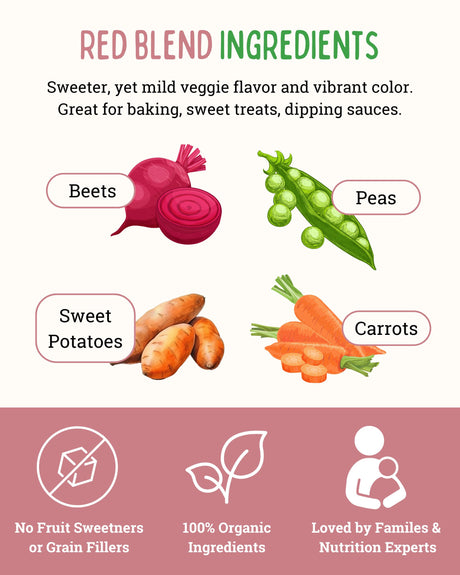Navigating the World of Fussy Eating
Decoding the "Fussy Eater"
We've all heard the term tossed around in parenting circles: "fussy eater." But what does it truly mean? At its core, a fussy eater is a child who has a selective or limited range of foods they're willing to eat. It's not just about disliking a vegetable or two; it's a consistent pattern of avoiding certain foods or food groups.
The Parental Struggle
For many parents, mealtime becomes a battleground. The joy of sharing a family meal is overshadowed by tension, negotiations, and sometimes even tears.
It's not just about getting them to eat their greens; it's the worry that they aren't getting the nutrition they need. The challenge? Balancing respect for a child's food preferences while ensuring they receive a balanced diet.
As we delve deeper into the world of fussy eating, we'll explore its causes, impacts, and strategies to make mealtimes more harmonious.
Defining Fussy Eating: Beyond Just Picky Choices
What is Fussy Eating?
Fussy eating, often interchangeably used with "picky eating," goes beyond a simple distaste for broccoli or peas. It's a consistent reluctance or refusal to eat specific foods or food groups.
While all children (and adults, for that matter!) have individual food preferences, fussy eaters have a more restricted range, often excluding entire categories of food from their diet.
Occasional Picky Eater vs. Chronic Fussy Eater
It's essential to differentiate between a child who occasionally turns up their nose at a new dish and one who consistently avoids certain foods. Most children will go through phases where they might be wary of trying something unfamiliar or suddenly decide they don't like a food they once enjoyed.
This is a typical part of child development. However, chronic fussy eating is more persistent and can limit the variety and nutrition in a child's diet. Recognizing the difference can help parents approach the situation with understanding and effective strategies.
Causes of Fussy Eating: Unraveling the Mystery
Developmental Causes: The Independence Phase
As toddlers grow, they begin to assert their independence in various ways, and food choices are no exception. This natural phase is often marked by a newfound desire to make decisions for themselves.
It's not uncommon for a toddler to refuse a meal simply because they want to have a say in what they eat. This quest for autonomy can sometimes manifest as fussy eating, as they navigate their control over their environment.
Sensory Sensitivities: More Than Just Taste
For some children, fussy eating is rooted in sensory sensitivities. Certain textures, from the sliminess of cooked mushrooms to the graininess of quinoa, can be off-putting.
Similarly, strong flavors or the combination of multiple foods in a dish can be overwhelming for some kids. It's not just about disliking a taste; it's about how the food feels in their mouth.

Past Negative Experiences: Food Memories
Unpleasant past experiences with food can leave a lasting impression. A child who has choked on a piece of carrot in the past might be wary of trying it again.
Similarly, foods that have previously caused allergic reactions or upset stomachs can be mentally blacklisted by the child, leading to avoidance.
Emotional and Psychological Factors: Beyond the Plate
Sometimes, the reasons for fussy eating aren't directly related to the food itself. Children might use food refusal as a way to exert control in situations where they feel powerless.
Additionally, anxieties or stress around mealtime, perhaps stemming from pressure to eat or negative feedback, can contribute to a child's reluctance to try or eat certain foods.
Physical Causes: When the Body Speaks
There are instances where fussy eating is influenced by physical factors. Certain medical conditions, like acid reflux or gastrointestinal issues, can make eating uncomfortable.
Additionally, some medications can alter a child's appetite or the way they perceive tastes, making previously loved foods suddenly unappealing.
The Impact of Fussy Eating: More Than Just Mealtime Struggles
Nutritional Concerns: Beyond the Basics
Fussy eating isn't just a phase; it can have real nutritional implications. When a child consistently avoids certain food groups or types of foods, they might miss out on essential vitamins and minerals.
For instance, avoiding vegetables can lead to a deficiency in vital nutrients like vitamin C and dietary fiber. Over time, these gaps in nutrition can impact a child's growth, energy levels, and overall health.
Emotional Toll: The Parent's Perspective
It's not just the child who feels the effects of fussy eating; parents and caregivers bear the brunt too. Watching your child refuse meals or eat a limited diet can be emotionally draining.
Concerns about their health, coupled with the daily stress of mealtime battles, can lead to feelings of guilt, worry, and inadequacy. It's a challenge that many parents face, often questioning if they're doing enough or if they're somehow at fault.

Social Implications: Beyond the Dinner Table
The effects of fussy eating extend beyond the home. As children grow and find themselves in social situations like school lunches or birthday parties, their eating habits can set them apart.
They might feel embarrassed or anxious about their food preferences, leading to potential isolation or reluctance to participate in food-centric activities. Over time, this can impact their social interactions and self-esteem, making it essential to address fussy eating holistically.
Practical Solutions for Fussy Eating: Navigating the Mealtime Maze
Creating a Positive Mealtime Environment: Setting the Stage
Every meal is an opportunity, and the environment plays a pivotal role. Establishing a consistent routine helps children know what to expect, reducing anxiety around mealtime.
A calm atmosphere, where everyone sits together, fosters a sense of unity and focus on the food. And while it might be tempting to turn on the TV or let them play with toys to coax them into eating, it's essential to minimize distractions.
This ensures that the child is present during the meal, making them more receptive to trying new foods.
Offering Variety Without Pressure: A Balancing Act
Variety is the spice of life, and this holds true for our meals too. Introducing new foods can be a challenge, but pairing them with familiar favorites can make the transition smoother.
For instance, if they love mashed potatoes, introducing mashed sweet potatoes as a side can be a gentle introduction to a new flavor. The key is to offer variety without making it a battleground. Adopting a "no pressure" approach, where the child doesn't feel forced to eat, can make a world of difference.
Involving the Child: A Collaborative Approach
There's something empowering about making choices. By involving kids in food-related decisions, whether it's picking a vegetable at the store or stirring the pot, they feel a sense of ownership.
This involvement can pique their interest and make them more inclined to try something they've had a hand in preparing.

Gradual Introduction of New Foods: Patience is Key
It's said that familiarity breeds liking. This is especially true for food. A child might need multiple exposures to a new food before they develop a taste for it.
Instead of making it a one-time event, reintroduce the food in different ways over time. The role of repetition cannot be stressed enough. Over time, their palate will evolve, and they might just surprise you!
Celebrating Small Victories: Every Bite Counts
Every step forward, no matter how small, is a victory. Did they try a spoonful of the new vegetable curry? Celebrate it! Positive reinforcement, whether it's words of encouragement or a small reward, can motivate them to keep exploring.
Remember, it's the small moments that build a lifelong healthy relationship with food.
When to Seek Professional Help: Navigating Beyond the Usual Picky Phase
Recognizing Serious Concerns: Beyond Just Being Picky
While it's common for children to go through phases of fussy eating, there are times when the behavior might signal a deeper issue. If your child consistently avoids entire food groups, shows signs of weight loss, or experiences gastrointestinal problems, it's essential to take note.
Additionally, if mealtime becomes a constant battleground causing significant distress to the child or family, it might be time to consider outside help. It's crucial to trust your instincts; if something feels off, it's worth investigating.
Pediatric Nutritionists and Feeding Therapists: Your Allies in the Journey
Pediatric nutritionists specialize in understanding the nutritional needs of children. They can offer guidance on ensuring your child receives the necessary nutrients and can suggest strategies tailored to your child's specific challenges.
On the other hand, feeding therapists, often occupational or speech therapists, focus on the mechanics of eating. They can help address issues related to texture aversions, swallowing difficulties, or other sensory-related challenges.
Both professionals provide invaluable support, offering tools and techniques to transform mealtime from a challenge into a more enjoyable experience for everyone involved.

Navigating the Fussy Eating Journey with Grace and Knowledge
Patience and Understanding: Every Child's Journey is Unique
It's essential to remember that every child is different, and their relationship with food will evolve over time. While it's natural to feel concerned or even frustrated, approaching the situation with patience can make a world of difference.
Understanding that fussy eating is often a phase, and even when it's more persistent, there are always strategies and solutions to explore.
Staying Informed and Connected: The Power of Community
One of the most empowering things parents can do is to educate themselves. By staying informed about the nuances of fussy eating, parents can approach challenges with a toolkit of strategies.
Moreover, sharing experiences with other parents can provide both comfort and new ideas. Whether it's through online forums, local support groups, or casual conversations at the park, connecting with others can offer invaluable insights and reassurance.
Seeking Support: It's Okay to Ask for Help
Lastly, if the journey feels overwhelming, it's okay to seek professional guidance. Whether it's a pediatric nutritionist, feeding therapist, or even a counselor, many professionals can provide tailored advice and support.
Remember, you're not alone in this, and there's a whole community ready to support and guide you through the fussy eating journey.
Leave your comments below; we love to hear from you! And don't forget to follow EasyPeasie for more veggie info and convo on YouTube, Facebook, and Instagram! ~ThePeas













